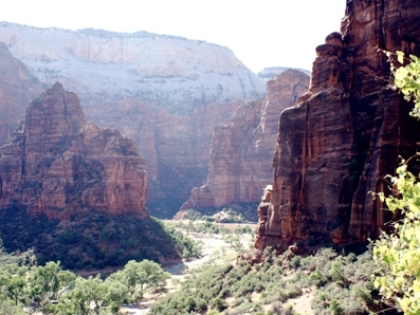This Outside magazine cover story, highlighting CNN anchor Anderson Cooper, was not quite what I expected, given its title. I thought it would be a discussion of why, as humans, we need a certain amount of risk in our lives—possibly including Cooper’s take on the subject.
 So I was a little disappointed to discover, upon reading, that it was, instead, short answers from 12 people who do somewhat risky things, about why they do them. Which isn’t at all about why anyone “needs” risk. A more appropriate title might have been “Why I Think the Risk is Worth It.”
So I was a little disappointed to discover, upon reading, that it was, instead, short answers from 12 people who do somewhat risky things, about why they do them. Which isn’t at all about why anyone “needs” risk. A more appropriate title might have been “Why I Think the Risk is Worth It.”
Looked at from that perspective, however, the answers were intriguing. Most of the people profiled were doing risky or difficult physical adventure things, from skiing big ocean waves to rock climbing to ultramarathon running. But there were two journalists in the mix, and two others who were combining physical challenge with an intellectual journey or goal.
The people pursuing pure physical challenges described very personal rewards: being challenged, performing at their best and expanding their abilities, and the intrinsic satisfaction of being in a world they loved. Anderson Cooper and Ivan Watson (the other NPR/CNN journalist profiled) talked instead about the importance of the stories they were taking risks to obtain; of bearing witness to people’s suffering, balancing objectivity with getting involved in rescue efforts, and of being haunted by some of what they’d seen.
Clearly, Cooper and Watson get some intrinsic, personal satisfaction from getting those stories and being in those places, or they’d have chosen another, less risky, career field. But their answers conveyed, quite clearly, that much of what they did wasn’t all that fun. They just thought it was important for people other than themselves. None of the answers from those pursuing pure physical challenges conveyed that sense of purpose or responsibility.
Reid Stowe, a 56-year-old “marathon mariner” as Outside described him, is wrapping up a record-setting 1,000+ days at sea without resupply. The journey, however, was not simply in search of a record. It was to explore what solitude would be like on a journey across the cosmic ocean to Mars, which would take at least 1,000 days.
So even as he plans his return to dry land on June 17th, Stowe’s answer about “why” reflected a man whose journey has been as much internal as external. “There are many reasons I decided to do this voyage,” he said, “but they’ve changed a lot since I first conceived of it, in 1986, and left land in 2007.” He goes on to say, “I’ve learned a lot about myself, being separated from society for so long.” And he wraps up with the deceptively simple statement “I kept going because I had to. What else could I do?”
I say deceptively simple, because Stowe’s statement sums up what so many of us might say about how we coped when faced with tough life turns, from loss of a job or unexpected single parenting to survival in a refugee camp.
At first, I also thought that those who offered more contemplative journeys and thoughts might be a product of age. Cooper is 42, and Stowe is 56. Perhaps, I thought, we’re more concerned with our own achievements when we’re young, and we think more about what it all means, or how it impacts other people, as we get older. But Ivan Watson is only 34. And kayaker, filmmaker and environmental activist Tripp Jennings, who’s managed to carve out a career exploring remote waterways of the world in the course of making films about environmental issues related to those waterways, is only 27.
Jennings spent more than a year living out of his Subaru (and maxed out five credit cards) while shooting his first film and developing a mix of adventure and activism that could get funded. None of which was fun, of course. But his thoughts on the subject—”you don’t get a dream job by filling out an application; you commit to your dream the same way you do a waterfall: pick your line and dive headfirst”—resonate for anyone contemplating an uncharted path.
So in the end, I’m still no closer to understanding why we need risk. But why do any of us choose or accept the risks we do? It’s obviously not simply a matter of age that drives our interests. But in any event, I think there’s a bit of alchemy involved. Somewhere along the way, we find a kind of transformational connection with a particular job, endeavor, or activity that makes that road important enough to us, either for purely personal reasons or because of the impact it can have—that we screw up our courage, pick our line, and dive headfirst.
Next post: Freedom Writers Ride Again
Previous post: Escape Routes






Risk helps us grow. We grow with the success and we grow with the failure. To risk is critical because our job here on earth may well be to develop ourselves to our highest potential. We cannot do that without taking risks. Risk can also be a destructive addiction if not used carefully. It needs to be a conscious journey not an unconscious one. Healthy risk helps us face our fears, not run from them.